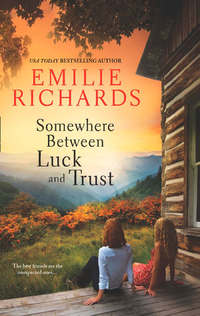
Полная версия
One Mountain Away
Maddie was sitting taller, and she flipped her disheveled ponytail over one shoulder. “Daddy!”
Ethan went into the kitchen to give his granddaughter privacy. While technically Jeremy and Taylor shared custody, Taylor had Maddie with her most of the time. Jeremy spent time in Asheville with his daughter whenever he could, but Maddie had never visited him at his home in Nashville. Ethan wasn’t sure if Taylor had convinced him their daughter was better off in familiar surroundings, or if Jeremy didn’t want to learn what he needed to know to care for her. Whatever the truth, Maddie adored and missed her father.
Taylor hadn’t been able to get to the dishes, and now, as Ethan stacked the apartment-size dishwasher he’d given her for Christmas, he hoped his daughter had gotten to the studio in time. She taught eight classes a week at Moon and Stars, and the owner was understanding. He just hoped Taylor hadn’t tested the woman’s patience tonight.
By the time Ethan had finished cleaning the kitchen, Maddie was still chatting with her father. He stood at the sink and stared out at the yard beyond. He was a shadowy reflection in the double-hung window—long face, pointed chin, high forehead—a man still attractive to women, judging by the offers of dinner and more he received from women at least a full decade younger than himself.
Beyond his reflection the faint outline of a crescent moon hung low in the still-bright sky, just visible beyond the neighbor’s tree line. A wisteria-scented breeze through the screen door ruffled his silvering hair. He was just fifty-six. Charlotte had been twenty-five when she had given birth to Taylor, and Taylor had just turned seventeen when Maddie was born. But this evening Ethan felt older than the mountains.
Spring was a time of renewal, of flowers bursting into bloom, of birds mating and building nests. He was twice divorced, but now his first wife, Taylor’s mother, was on his mind, and so was the spring right before they met.
He had only been twenty-five, an intern at a local architectural firm and still a stranger to the city that was now his permanent home. With few contacts and no real friends, he had begun jogging after he returned home in the evenings from the office. He had often parked in unexplored neighborhoods and jogged along residential or downtown streets to learn more about the Blue Ridge community where he’d landed.
Now he remembered one such evening, twilight just beginning to thicken around him and the same haunting fragrance in the air. He had chosen Montford for his jog, a historic neighborhood with a satisfying mixture of architectural designs, some shabby and in need of renovation, but many that were still prime specimens of another generation’s craftsmanship. He’d begun on Montford Avenue, then veered off on a side street to avoid traffic.
He had been lost in thought about the blueprints for an office building he’d been asked to comment on, just aware enough of his surroundings that he didn’t stray into traffic or run behind a car backing out of a driveway. He’d dodged a woman walking two identical yapping poodles, stumbled over a loose chunk of concrete.
Funny the details he still remembered.
He had just been ready to turn the corner and circle the block on his way back to his car when a woman on the next block caught his eye. Back then, as now, Asheville had been filled with young women. He had been as appreciative as any twenty-something heterosexual man of the opportunities, but having just moved away from a failed love affair, he had also been wary.
This woman, seen at a distance, was more vision than flesh. A ruffled skirt floated just above her ankles, a scoop-necked blouse bared a long, graceful neck. Her hair curled over her shoulders, shining and hinting that it might be red, although in the dying light, he couldn’t tell for sure.
Something about the way she hurried tugged at him. She was willowy, bending into the breeze like a sapling at the edge of a mountain stream. He liked the way she held herself. He liked the curve of her hair, of her jaw, of her breasts. He liked the graceful yet determined way she moved up the sidewalk, as if she had all the time in the world and none of it to spare.
He’d wondered then whether the vision-made flesh would be less than this fleeting glimpse. Would he be disappointed, sorry the dream was eclipsed and replaced with reality? He remembered that he had been torn between speeding up or slowing down, and before he could decide, the vision had entered the ground floor of a funky old Tudor and vanished behind the door, never to be seen in that place again, despite more frequent and increasingly desperate jogs.
Charlotte Hale, his twilight vision, who months later would spring to life in a university classroom, and who had not, at least for years, disappointed at all.
Charlotte, who, as it turned out, had been best enjoyed from a distance.
Charlotte, who, this afternoon, unless he was mistaken, had abandoned a park bench as he approached, just thirty yards from the climbing dome where their granddaughter had been playing with her friends.
Chapter Four
First Day Journal: April 28
“Only God knows the hour of our death!”
I’m sitting in a coffee shop not far from Biltmore Forest, because I’m not ready to face my empty house for the evening. I’m writing in this journal with hopes those words will stop revolving in my head once I commit them to paper. Reverend Ana spoke them this afternoon, with no idea of their impact. But the first time I heard them was on a day I wish I could forget. In far too many ways that day defines me.
Maybe in real-time it’s April of my fifty-second year, but in my mind it’s August, and counting backward I think the year must be 1970. I’m ten years old, Maddie’s age, and I’m sure I’ve been sitting in our little country church for at least a century. But, of course, at ten, so much feels that way.
Ten yards in front of me the preacher slaps his Bible against our pulpit, one my grandmother is particularly proud of, since her own father carved it from a fallen black walnut tree. When I was six Gran pointed out the stump of the “pulpit” tree in a wooded clump not far from her kitchen garden. Sometimes now I go there to think, especially when Hearty comes home drunk, which is most of the time.
I’m startled by the slapping noise, and only Gran’s withered arm across my chest keeps me from diving under the pew in front of us.
“Lottie Lou, you sit up now, and no more dozing,” she whispers to me as she hauls me closer. “Else you’ll end up being the ’zample in this fool’s sermon, you get my meaning?”
The preacher screeches the same words again. He’s a guest in the pulpit of our church, the Trust Independent Baptist Church, because the regular preacher, equally loud but less given to repetition, is hauling a truckload of hand-harvested burley tobacco to Raleigh. Preaching is something he does on the side, for the sake of the Lord.
The guest preacher farms tobacco, too, but his is as sorry as his sermons, so it isn’t likely he’ll need a truck or a trip any time in the near future. He’s as scrawny as a cornstalk in a drought, and he drools when he shouts, so now his chin glistens.
I wriggle on the unpadded bench to get blood flowing to my backside. The service started with hymns, then the preacher demanded we stop singing so he could preach—which he’s been doing forever. I worry we’ll be here another hour or more.
And while we listen to Preacher Pittman’s substitute fumble with words, what will Hearty Hale be doing?
It’s as hot inside as it would be if we were standing full in the sunshine. All week the church is closed up, and it takes more than half an hour to suck out the heat before services. The building sits to the side of a country road, and there’s no electricity for fans, although we have a woodstove for winter. Windows dot the walls to let in what breeze can be had, but we have no screens. Wasps fly in and out and circle the freshly washed heads of worshipers.
I have nothing to do except think about the words that brought me so fully awake. I can’t picture a God who not only knows when everybody on earth is going to die, but keeps track of the information, too. I wonder if He makes notes, or if He can just snap His fingers and call up whatever He needs in an instant.
I imagine God pointing and shouting, “You over there, your day’ll be July 17, 1977, and not an hour later! And if I was you, I wouldn’t bother taking out pork chops when you get up that morning. You won’t be needing them.”
When I giggle, Gran pokes me with her elbow. I look for something else to occupy my mind. I settle on a girl who’s two years ahead of me in school and two rows in front of me now. She has white-blond hair, wispy and fine, and she’s pulled it back from her face with a black velvet hair band that has a bow on the side, anchored with a cluster of rhinestones. Her name is Sally Klaver, and she lives not far away, in a brand-new house, brought in by truck and set right down on a slab of concrete. The house is the color of a creek bottom, with a porch in front, just big enough for a pot of flowers and a doormat with Welcome printed nice and proper on it.
The old house, where Sally used to live, is still standing back behind some trees, but it’s boarded up now, and most likely full of mice and hornets’ nests. Sally’s daddy runs cattle and fattens more from his acres of corn. Mr. Klaver grows more tobacco than anybody else in the vicinity. I wonder what that would be like, having a house nobody else ever lived in, having enough cattle to eat beefsteak every night, having money to just walk into a store and buy a velvet headband whenever I felt like it.
I’m not just tired of sitting, I’m tired of worrying, too. This morning our neighbors, Bill Johnston and his wife, picked up Gran and me as we walked down the road on our way to church. Gran squeezed into the cab, and I settled myself in the back of the truck, making a little nest on an old piece of canvas to keep my dress from getting dirty.
I was glad to sit in the open. As we bumped over the dirt road I watched out for my father, but I never saw a sign of his truck or him. I’m not worried something’s happened to Hearty. I’m not even hoping it has, at least not while I’m sitting in church, because it’s possible God listens a little harder here, and wishing your father would keel over dead might get you in trouble.
Right now I just want to know where Hearty Hale is this morning, and whether he’s going to make Gran or me that much more miserable later.
The preacher finally wears down and stops, slamming his Bible one more time against the pulpit as he shouts “Amen.” The girl who’s playing the piano leaps to her feet and throws herself across the bench, as if she’s afraid he might change his mind.
In a moment we’re all singing “On Jordan’s Banks,” and the preacher is exhorting sinners to come forward and make a commitment to Jesus. I figure everybody’s as hot and cranky as me, because today only a few straggle forward, as if afraid the preacher will keep shouting until supper time if they don’t.
After the last chorus I shake down my skirt and admire the lace adorning the hem. My grandmother added the lace by hand to “prettify” my dress, something she made over from one my own mother wore as a girl.
When I was younger I might have been thrilled at this connection to Thalia Hale, but now I’m not so sure. My mother died of pneumonia just one month after giving birth to me, her only child, and with ten years to consider it, I’ve decided it’s likely Thalia thought the best way to get away from Hearty and her squalling baby girl was to cross the river Jordan as swiftly as possible.
I wish that weren’t true, but even Gran admits she indulged the sickly young Thalia shamelessly, and forever after Thalia did exactly what she pleased. Gran’s told me pretty stories of baby birds my mother rescued, poems she learned and songs she sang, but nobody else has ever said a good word about Thalia in my presence. And I’ve been paying close attention.
Around me now people are moving into clusters, most pausing near windows or the door, catching up on the week’s gossip while they try to catch a breeze. Gran will linger. Despite the sorry state of the Sawyer farm—which is what everybody in Trust calls our home place—and the sorry state of her son-in-law, the local people respect Gran and wish her well. As far as they can, they do whatever they’re able to be neighborly, just as long as it doesn’t involve helping Hearty Hale.
“Lottie Lou…” Sally Klaver of the velvet headband rounds the corner of her pew and heads straight for me. “Weren’t that just awful? Him going on and on like that? I wish we’d gone over to Marshall. They got air-conditioning at the church there, but my daddy says we have to come here sometimes, too, so people don’t forget who we are.”
I figure nobody will ever forget Sally’s family, because the Klavers will always be sure to hang their good fortune right out where everybody can see it, like a bedsheet flapping in the wind.
“That a new dress?” Sally asks, smiling a little as her gaze drops lower.
Despite myself I stand straighter. “My gran made it for me.”
“I guess she made it big, so you’d get lots of wear out of it.”
I can feel the heat rising in my cheeks.
“But green’s a good color with that red hair of your’n,” Sally continues. “Of course, you got to be careful what you wear with hair like that. I’m lucky anything goes with mine. That’s what I told Ma when she brought this brand-new dress home from Charlotte. ‘Get me anything, ’cause it’ll look good on me, I reckon.’” Sally holds out the short skirt of a black-and-yellow-striped dress that looks exactly like a man’s undershirt.
I wish with all my heart that I had one, too.
“It’s real pretty,” I say. “And I guess she bought it big ’cause one of these days you’ll fill it out real nice.”
Sally has narrow eyes, a little too close together, and at that, they narrow even more. “How’s that daddy of your’n? Thought I saw that truck he drives down yonder by the creek.” She flips her hand carelessly over her shoulder. “He fishing while you get right with Jesus?”
I wonder if there’s any truth in Sally’s claim. “Could be. Hearty doesn’t answer to me.”
“You call your father Hearty?” Sally tries to look surprised.
“Everybody calls him Hearty.” I’ve never called my father anything but, although it’s only a nickname he got as a boy on account of his last name, barrel chest and wide shoulders.
“He didn’t tell you anything before he left home this morning?” she probes.
I haven’t seen my father in two days, but I’m not about to report that. “Your daddy tell you where he’s going every minute?” I ask with a toss of my head. “Seems like he’d be awful busy for that, but maybe he’s got all the time in the world to account to you.”
Sally just repeats the sly smile that matches her eyes. “He don’t, on account of how hard he works. But even if he only worked an hour a week, that would be more than your daddy works in a month.”
I can hardly argue. I wait for the next blow. Church is no different than school, where I’m an outcast because I come from one of the poorest families in a poor county. I’ve learned to fight back a little, but I’ve also learned it doesn’t help. There’s nothing I can say or do that will change anybody’s opinion. I am Lottie Lou Hale, daughter of Hearty Hale, whose reputation is as troubled as nearby Spring Creek in a winter storm.
“You oughta come over to our house sometime,” Sally says. “Get that daddy of your’n to drive you, if you can find him.” She smirks and turns away, lifting her hand in a careless wave. Anybody watching will think we’re friends.
I go to find my grandmother, who’s up front talking to the real preacher’s wife. Mrs. Pittman is as tall as any man in the place, with skin that’s seen too much sun and eyes that have seen too much sorrow. Years ago the Pittmans lost their two children in a house fire. She claims her faith got her through it, but to look at her grim mouth and tired eyes, I’m not sure it’s done the trick.
“Mrs. Pittman says she’ll take us home today,” Gran tells me. She waits for me to add my thank-yous.
“That’s mighty nice of you,” I say dutifully. “It’s a long walk for Gran, with her arthritis and all.”
Gran’s arthritis, which cripples her once-sturdy legs and twists her arms, is, in my view, worse than having a drunk for a father and a mother who died rather than face her unfortunate choices. Gran’s had enough problems trying to make do with nothing, trying to raise her granddaughter and keep her husband’s family farm from being taken for taxes or sold off by her greedy son-in-law.
Unfortunately, my grandpa never made a will. He died suddenly, so the farm was divided by the state, one half to Gran, and one half to my mother, their only child. When Thalia died without a will, her half was divided again, half to Hearty and half to me. This means Hearty only owns one-quarter of the property, but he wields it like a hatchet. Any time he’s unhappy, he threatens to sell his portion along with mine and leave Madison County forever.
So it isn’t as if Gran hasn’t had plenty of trouble. But she holds her head as high as her aching neck will let her and just keeps going. She’s old, though, and the arthritis wears her down. She is increasingly grateful for any help and says pride is a luxury a woman like her just can’t afford.
“We’ll go in a few minutes,” Mrs. Pittman says. “Preacher Pittman asked me to check on two people before I leave. You know which car is ours. You can go ahead and get in if you like. I’ll be quick as I can.”
I wonder if Mrs. Pittman calls her husband “Preacher Pittman” when they’re alone together, eating dinner or plowing their garden.
“Right nice of her to offer,” Gran says, after Mrs. Pittman strides off to find the objects of Preacher Pittman’s concern. “I weren’t sure I wanted to walk home after all that sitting.”
“Sally Klaver said she saw Hearty by the creek down yonder.” I point in the direction of the back of the church.
“None of them Klavers knows a truth from a lie. That’s how come they came into so much land. Her grandpa cheated a brother out of his inheritance, just like Esau and Jacob, and took it for himself. Me, I take anything any one of them says with a grain of salt.”
I feel a little better that I’m not the only one in the church with no-good relatives. “He could be back there, sleeping by the creek,” I warn. “It’s the kinda thing he’d do.”
“If he is, he’ll wake himself up when he’s good and ready. You don’t need to worry about Hearty.”
I’m still standing in church, so I know better than to risk the Lord’s wrath by admitting how little I worry about my father. I lower my voice. “I was worrying he might wake up and come wandering up here.”
“We’ll be gone soon enough.”
But we aren’t, not nearly, because when we walk through the door to get into the preacher’s car, Hearty is staggering up the road, his shirt wrinkled and unbuttoned, his belt unbuckled and his pants sagging down around his hips. I see he is dirty and unshaven, and his hair, which hasn’t been cut in months, looks like a tangle of fishing line.
More than half the worshipers are still standing in the shade of dogwoods heavy with creamy blossoms to chat with friends. As if they are one body, they turn to watch Hearty’s approach.
“You go down and see if you can head him off,” Gran says softly. “I ain’t got the strength to do it myself, and I’m not fast enough.”
“What’ll I say?”
“I don’t rightly know. Maybe something about his truck. Maybe somebody told you he’s got himself a flat tire. Tell him you’ll go with him to see.”
Hearty does love his old truck. When he’s sober, which isn’t often, he spends hours under the hood, and even though he’s too lazy to pick fights for no good reason, he can flare into a rage if the truck gets scratched or dented. The sheriff has slapped him in jail a time or two for truck-related attacks.
I head quickly toward my father, my cheeks blazing with embarrassment. I keep my head high, although what I want most is to look at the ground and not at the faces turning toward me. I hear somebody snickering, and see Sally Klaver with a small group of kids around her age, watching and pointing.
“Didn’t I tell you I saw him down by the creek?” Sally calls. “Ought to have gone and looked for that ol’ drunk before he came callin’.”
I just lift my head a little higher and move my feet faster.
I reach Hearty before he gets to the parking lot.
“Hearty!” I call. “Where you going?”
He squints at me as if he’s trying to recall where he’s seen me. Once he was handsome enough to steal my mother’s heart, despite all warning from my grandmother. Now his belly hangs over the top of his pants, like a woman in her final months of pregnancy, and his skin is slack and sallow. I haven’t inherited anything obvious from my father except his auburn hair, but today Hearty’s is the color of Georgia mud.
“Came to get money…” He stops, as if trying to remember what he was just saying. “That grandmother of your’n,” he finishes, after a long moment during which he sways from side to side, as if considering which way to fall.
“Gran doesn’t have any money, Hearty. Her check comes next week, and there’s nothing left of the last one.” I remember what my grandmother has told me and change the subject. “Listen, while you’re here, one of those girls up there said she saw your truck, and you got a flat tire in the front. I’ll go back with you. Maybe we can wrestle it off together.”
“You…come with me?” He snorts. “Since…when you want to be anywhere I am?”
“You want help with that tire or not?” I ask.
“Ran out of gas.” He stares beyond me, as if looking for my grandmother so he can plead his case.
Hearty works in the woods cutting and hauling lumber, but he rarely has money. When he manages to gather a little he buys gas and liquor, in that order, since this is a dry county and he needs the first to get the second. I doubt he’s really run out of gas, but I bet he’s run out of liquor.
I hear a noise behind me and turn. Mrs. Pittman is coming toward us. Her dress has red-and-white checks, like a tablecloth Gran uses in the summertime, and the skirt snaps angrily against her calves.
“That…ol’ scarecrow…” Hearty spreads his hands in some odd sort of illustration, and the motion nearly sends him careening into me.
“What’s happening here?” Mrs. Pittman asks in a voice that says she already knows.
“Nobody…ast you for a ’pinion,” Hearty says.
“You owe this child better than showing up in public looking the way you do,” Mrs. Pittman says. “You’re embarrassing her and your mother-in-law.”
“Don’t care.” Hearty waves his hands again. “I need money. You got some you want to rid yourself of, I’ll take it…and be gone.”
“You’re lower than a rattlesnake, Hearty Hale. You ought to get down on your knees and beg the Lord for forgiveness. You’ve tried the patience of the rest of us for too long. He’s all that’s left.”
Hearty spits on the ground at his feet. “Somebody here’ll give me money.”
“Not as long as I’m standing here. Now you go back the way you came, you hear?”
By now I want to throw myself off a mountain ledge. I know everyone is watching, and a glance over my shoulder shows two of the men from the service are coming up behind Mrs. Pittman, one of them the morning’s preacher, the other Sally Klaver’s father. I realize that most likely they are spurred by embarrassment that a woman has been forced to lead the charge.
Hearty sees them, too, and realizes they aren’t coming to help him. With a snarl, he falls forward. I’m not sure if he propels himself in Mrs. Pittman’s direction, or if he merely loses his precarious balance, but without thinking I sidestep quickly and just in time. In a moment my father is sprawled on top of Mrs. Pittman, pinning her to the ground.
The men launch themselves forward to drag Hearty away. As drunk as he is, he fights back, slugging the preacher in the stomach with a fist, kicking out at Mr. Klaver with the toe of his worn work boot. It’s all over in a moment. While sober he might have held his own, now he’s slow and uncoordinated. The men grab him under the armpits and haul him off Mrs. Pittman, who sits up, then manages, with my help, to get to her feet. By then Gran has joined us.







